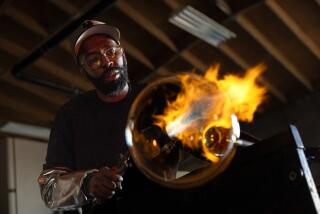In Service Family, a Woman Dies : Casualties: Adrienne Lynette Mitchell’s father, a career Air Force man, says ‘Men get killed in wars all the time. But she’s my daughter.’
- Share via
MORENO VALLEY — The Mitchells did their courting in Little Rock, Ark. Frank was a 24-year-old Air Force man who had a reputation as a boxer. He’d fought more than 150 amateur bouts, winning all but six. Sammie was a local girl, 19 years old and dreaming of marriage. For some reason, she wanted to have six children, all boys.
Sammie agreed to wear Frank’s ring on one condition--that he give up that other ring. “I didn’t want him punch drunk,” she said.
Their first baby, Frank Jr., changed Sammie’s mind about wanting a big family. “I wasn’t going to have no more kids,” she said. “But he wanted a little girl. And that was Adrienne.”
Two decades and half a dozen Air Force bases later, the Mitchells live in a comfortable two-story tract home here that is filled with the memorabilia of Frank’s 30-year career and, as of this week, a certain emptiness.
Adrienne Lynette Mitchell, 20, was among the 28 American soldiers killed when an Iraqi Scud missile struck a military barracks Monday night in Dharan, Saudi Arabia. Along with 22-year-old Christine Mayes of Rochester Mills, Pa., and 23-year-old Beverly Clark of Armaugh, Pa., who also died in the Scud attack, Adrienne was among the first American women to die in combat in the Gulf. Two days after she was killed, combat came to an end.
Her father had served 30 years and 21 days without suffering so much as a scratch. She had served five months--only 10 days overseas, far from the front lines. “Wrong place, wrong time,” her father said.
The saddest week of the Mitchells’ lives began with an eerie sense that something was wrong. Returning home from his new job, Frank turned on the television and saw a news report of the Scud attack. The Mitchells knew their daughter was somewhere in Saudi Arabia, but not exactly where. Yet when Frank Mitchell saw the images of the wrecked, smoldering barracks, he turned to his wife and said, “Adrienne’s in there.” Then he turned off the TV.
He didn’t sleep that night, he said. “My mind,” he said, “was telling me something I didn’t know about.”
The next day, Sammie got the official word first, arriving home to find three Army officers waiting at her door. She called Frank at his new trucking job and suggested he sit down.
“He said he didn’t need to sit down,” Sammie recalled. “He said, ‘It’s Adrienne, isn’t it?’ ”
For the Mitchells, there have been two days of condolences from friends and relatives, of wondering why and assuming that God has his reasons. There has also been a steady procession of TV news crews, reporters and photographers to their comfortable, two-story home, all engaging in the awkward business of collecting quotes, sound bites and images.
“Well, I feel numb and I don’t feel like eating anything,” Sammie Mitchell said, her tone quiet. “I just don’t feel like doing anything.
“And the body’s beyond recognition. I just learned that this morning. So I’ll never get to see her again.”
As a military man himself, Frank Mitchell said he understood that death is the risk military people accept in warfare. Still, “men get killed in wars all the time. But she’s my daughter,” he said.
“I pray every night and I say dear God why didn’t you take me instead of her?” he added. “. . . I don’t know why he took her away. My daughter never bothered anybody.”
The Mitchells maintained their composure throughout an hourlong visit, sometimes smiling at pleasant memories. When they met, Frank recalled, “I was a three-striper making $40 a month.”
Courage, it is said, is grace under pressure. Time and again, they tried to describe their feelings, sharing memories, baby photos and old passports. Frank played a video of his retirement ceremony showing the smiling Adrienne accepting a “Certificate of Appreciation” on behalf of her mother. Three American flags presented to Frank upon his retirement were on display, folded in triangles, along with trophies and plaques honoring his years of service. It was Adrienne, Frank said, who cleared away other bric-a-brac to make room for the flags.
Souvenirs from Taiwan were also on display. The Mitchells were stationed there when Adrienne was born, one stop on a military life that had the family hopscotching around the globe. After Taiwan, they moved to bases in New York, Texas, Missouri and then March Air Force Base in Riverside. After that came an assignment in Belgium--”kind of boring,” Sammie said--and then a base in Ohio. Then it was back to March.
Family was the one constant. The Mitchells remembered how, as a toddler, Adrienne would follow her older brother and waited for him to come home from school. “She was his trained puppy,” Frank said, smiling.
Settling at March, Adrienne did a lot of growing up at Moreno Valley High School.
“As a freshman, she was typical--mouthy, fun-loving, not too serious about anything,” said home economics teacher Maxine Shepherd. Always outgoing, Adrienne matured into a more serious student who played basketball, ran track and set goals for herself, the teachers said. She got Bs mostly, graduating with a 3.03 grade point average.
“In her writing, I can remember her saying she wanted to better the situation for her people--for blacks,” recalled LoRee Gastineau, an English teacher. “I can remember her writing about wanting to make a difference.”
After high school, Adrienne worked in a pizza parlor, in a bowling alley and as a cashier in the “chow hall” on the base. Her brother, four years her senior, had done an Army hitch and the educational benefits were appealing. She talked about someday enrolling at UCLA and studying law.
Frank Mitchell said he tried to talk Adrienne out of joining the Army, suggesting that she could get a student loan to cover the college expenses that he couldn’t. But Adrienne liked her independence, her parents said. She never wanted to be a burden.
Frank said he believed America was right to go to war, but when a TV reporter asked him what he might want to say to Saddam Hussein, he bore no grudge. “Well, I couldn’t say he was wrong because of the fact we were fighting that country.” Iraqi troops were in more danger than his daughter, he said. The Scud attack, he said, was a fluke.
Sammie told the reporter that if she could talk to Hussein, she’d probably kill him. But she isn’t sure this is a war America should have even fought. “That’s really hard to say. . . . We’ve been in so many other peoples’ fights.”
Later, it was a photographer’s turn to pose the Mitchells and ask the awkward question: Would they mind holding Adrienne’s portrait?
“I wouldn’t mind at all,” Frank said, reaching for the picture. “That’s my baby.”
More to Read
Go beyond the scoreboard
Get the latest on L.A.'s teams in the daily Sports Report newsletter.
You may occasionally receive promotional content from the Los Angeles Times.










